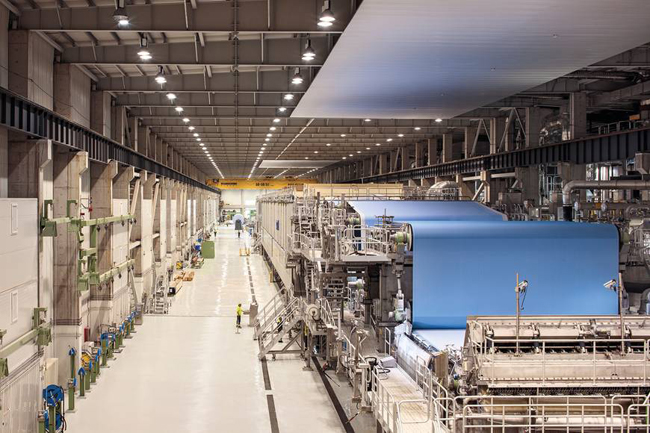“It is nearly impossible for an investment banker operating in the Nordic region not to know the forest industry. I felt that it was the field of industry I was most familiar with and that it offered an interesting challenge,” states Wahlroos. Recent years have posed more than enough challenges for the Board. “UPM has been able to make balanced adjustments to its capacity and ways of working in a very challenging environment.”
All strategy work is based on the principles of increasing shareholder value and prioritizing shareholder views. Wahlroos believes that the smart strategic choices made by UPM’s paper business in Europe and North America (ENA) – the company’s largest business area – have been most important from the shareholders’ perspective. “The demand for paper has been declining continuously in developed countries, so it’s really an issue of employing delay tactics. The companies with the best resources will be the most successful in this situation.”
UPM’s paper machines outperform the competition in terms of efficiency. Optimally located production capacity and well-planned operations have helped the company to uphold high capacity utilization rates at its mills. “This has enabled us to maintain profitability even in a situation which has forced many of our competitors into a struggle for survival. We still need to continue our strict cost management in the future,” Wahlroos states.
New growth through innovation and pulp
During Wahlroos’ term, UPM has advanced its Biofore strategy, which pools the strengths of the bio and forest industries to build new growth and a sustainable, innovation-driven future. The company has already initiated commercial production of a renewable wood-based diesel fuel. UPM also develops wood-based biochemicals. The demand for these kinds of products is expected to grow significantly over the coming years. “We are at a fascinating technological turning point where we are seeing major progress in the use and refinement of wood fibres. This opens up new opportunities for UPM.”
The pulp business is another important growth area for UPM. The demand for pulp is continuing to grow, particularly in developing economies. The investments recently made by UPM in its production facilities will help to strengthen the company’s foothold in the pulp market. The efficiency of UPM’s pulp mills and their use of the latest technology are among UPM’s core strengths, Wahlroos notes. Two thirds of the pulp produced by UPM is sold to customers around the world, mainly in Europe and China.

Wood-based UPM BioVerno reduces greenhouse gas emissions by up to 80%.
Shareholders want dividends
In recent years, reducing the company debt and strengthening the balance sheet has been a key objective for UPM. In the third quarter of 2016, net debt was reduced to less than EUR 1.5 billion. In 2008, the total sum stood at EUR 4.3 billion. “The huge debt was beginning to pose a risk. Our corporate credit rating had fallen into the ‘junk’ category, and climbing back up has been a tough job. Our credit ratings still haven’t improved enough, but they will continue to get better.”
Meanwhile, UPM has increased the dividends paid to shareholders year by year. “UPM’s shareholders include many large foundations, funds and foreign investors. These shareholders expect a significant portion of the company’s increased capitalization value to be distributed as dividends. The wisest thing the company can do is to listen to them and apply a stable, relatively generous dividend policy.”
UPM will continue making investments, but the process will be smarter and more selective. By way of example, he points to UPM’s substantial investments improving the efficiency of pulp mills and increasing production capacity in Finland and Uruguay. The investments that have already been realised or are currently ongoing will increase capacity by 500,000 tonnes, which corresponds to the capacity of one traditional pulp mill. “We have been able to increase production capacity significantly by making relatively small investments and by removing bottlenecks in our production.”
Among its largest recent investments, UPM started up a new special paper machine in China in 2016 that has increased capacity by nearly 400,000 tonnes. In addition, UPM has announced that the company is assessing the possibility of building a new short-fibre pulp mill in Uruguay. “There has probably never been a comparable case in the history of the forest industry where a company can take its time considering a two-billion-euro investment without having to worry about financing. UPM is in this fortunate position today.”

Changshu paper machine 3
Responsibility brings stability
Wahlroos is optimistic about the current global economic outlook, which provides a positive cue for new investments. “The global economy is expected to grow at an annual rate of 3–4 per cent in the next five to ten years. This growth is driven by China and India. Unfortunately, this casts Europe in the role of the ‘sick man’ of the global economy.”
A responsible business is usually more efficient at risk management and provides a more stable profit return for its shareholders in the long run. “For me, responsibility means that we are primarily responsible to those who have invested the most resources in our company. Our primary responsibility is to our shareholders and to the financiers. We are also responsible for ensuring that the company complies with all legal regulations and the highest standards of good practice in all its operations. This way, we are also shouldering our responsibility with respect to other stakeholders and society overall.”
Wahlroos additionally emphasizes the importance of adhering to a responsible human resources policy. “In recent years, we have made a special point of promoting safety at work, for example. Our efforts have paid off. UPM’s occupational safety statistics have improved dramatically.”
Read more
The article was first published in the Biofore Magazine
The inauguration of UPM's 3rd paper machine in China in 2016
The Kymi pulp mill investment significantly increased pulp production capacity
UPM as a responsible investment
Through the renewing of the bio and forest industries, UPM is building a sustainable future across six business areas worldwide. Our products are made of renewable raw materials and are recyclable. The group employs around 19,600 people and its annual sales are approximately EUR 10 billion. UPM is listed on UPM shares are listed on NASDAQ OMX Helsinki.
- UPM is listed on CDP Forest A list and is the forest and paper industry leader in the Dow Jones Sustainability Europe Index (DJSI) for 2016-2017.
- UPM was invited to join UN-led Global Compact LEAD in January 2016.
Read more about UPM as an investment.
Matti Remes
